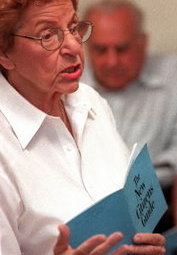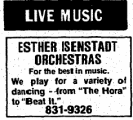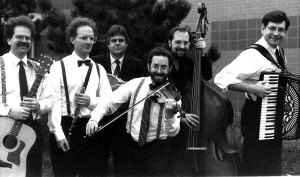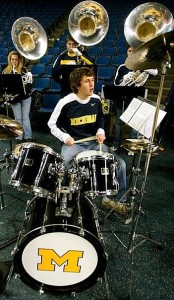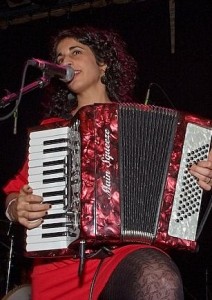CLEVELAND IS NOT A CUPCAKE
A man with a strong Israeli accent called. I thought he wanted to rent a store. A lot of prospective store renters have foreign accents, particularly Middle Eastern.
But the Israeli wanted to talk music. He wanted to sell me a Yiddishe Cup ringtone.
Then I got a call from Elias, who wanted to open a bakery.
“You would be my second Elias!” I said.
This Elias – like the first Elias — was Lebanese.
I’ve also rented to Eli, a driving school operator.
Christian Arabs are often Eli, Elias, or Mike. Or Sammy.
 I rented to Shaukat Ali. Not a Jew. (Not a Christian either.) Ali was a Pakistani computer repairman. He began wearing all white, growing a beard and praying in his store. He lost some business.
I rented to Shaukat Ali. Not a Jew. (Not a Christian either.) Ali was a Pakistani computer repairman. He began wearing all white, growing a beard and praying in his store. He lost some business.
Widad called. I asked Widad if that was her first name. Yes. She wanted to open an Arab restaurant. She said, “Have you ever been to the Middle East?”
“Israel,” I said.
No biggie. Most Arab store owners are just trying to make a living.
I once attempted to talk Middle East politics with an Arab tenant. He said, “That’s over there. I’m here.”
Wadid wanted to sign the lease right then. I said, “Whoa, Widad” (to myself). I said, “You’ll need about $100,000 for grease traps, exhaust hoods, upgraded electrical service, architectural drawings, two ADA-approved bathrooms and a fire extinguisher system.”
The restaurant didn’t happen.
***
There were two Ivans, both Croatian shoe repairmen. One was small and friendly, and the other was terrible. He banged so relentlessly on his anvil he nearly drove the photographer next-door nuts. I had the walls soundproofed.
But we purposefully did a shoemaker (a lousy job) on soundproofing the shoe repair store. To soundproof a room correctly, you have to float a new wall and stuff the crawl space with fiberglass, and it still won’t work.
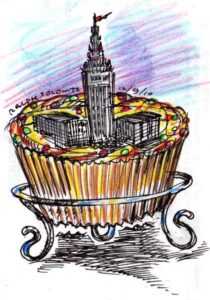 A friend considered opening a cupcake shop.
A friend considered opening a cupcake shop.
Cleveland is not cupcakeville, I thought. I said, “You can go broke with a trendy concept in Cleveland.”
You don’t need cupcakes.
But if you do, there is an excellent Hungarian bakery. You drive by this place for years and don’t even notice it. Tommy’s Pastries, Madison Avenue, West Side. There is nothing in the display windows. Tommy’s makes a zserbó, a chocolate/walnut/apricot dessert.
Zserbó is the Cleveland cupcake.
—–
Bandleader Walt Mahovlich told me about Tommy’s and zserbó. (Pronounced ZHAIR-boh.)
—–
Here’s an amusing new video — and free singing lesson — from Yiddishe Cup’s alternate drummer:
—-
Please see the post below too. It’s fresh goods.
December 15, 2010 4 Comments
WALKMAN MAN
Walt Mahovlich, the leader of the Gypsy-style band Harmonia, had hundreds of cassette tapes in his living room. He had custom-made bookshelves lined with tapes. There were Yugoslavian field recording from the 1970s and commercial ethnic tapes from the 1980s and 1990s. And he had dubbed some LPs to tape.
Walt’s wall o’ tapes was organized by nationality: Albanian, Croatian, Hungarian, Jewish, Macedonian, Romanian, Rusyn, Serbian, Slovak and Turkish.
A tape — a brand-new chrome tape with Dolby — often sounded as good as the original LP. But few dubbers bought chrome. Even the commercial tapes released in the 1980s weren’t always chrome.
One big downside to tape: the tape player would occasionally eat the skinny tape, and you’d have to splice it back to health.
The cassettes, with their cases, were compact. Give them that.
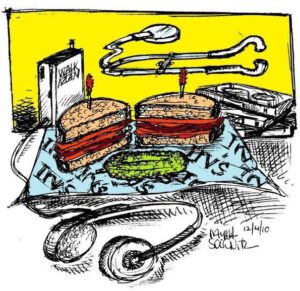 I bought a Sony Walkman cassette player in 1981, just prior to my first son’s birth. My wife, Alice, went through three 24-hour shifts of obstetricians before she delivered. I had the cassette tapes (dubbed jazz LPs) and two corned beef sandwiches from Irv’s Deli. I was set. My wife had complications.
I bought a Sony Walkman cassette player in 1981, just prior to my first son’s birth. My wife, Alice, went through three 24-hour shifts of obstetricians before she delivered. I had the cassette tapes (dubbed jazz LPs) and two corned beef sandwiches from Irv’s Deli. I was set. My wife had complications.
The doctors wanted to check it out. Not the complications. The Walkman. They had never seen one.
Three years ago I bought a Chinese Walkman knock-off for $40 at Radio Shack. I thought the Walkman might disappear.
Sony recently announced the end of Walkman cassette player production.
Two words: Stock up.
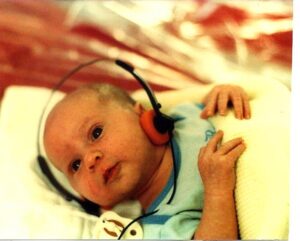
Teddy Stratton, 1 month
***
Walt Mahovlich’s wall o’ tapes still exists in the same West Side living room.
Last week Walt said, “I should transfer my tapes to digital. Who knows how long they’ll last — the tapes. But what I really need to do is record a 78 — something that will really last!”
“You want to record a 78 RPM?”
“Yes. Alan [Yiddishe Cup’s keyboard player] has a 78-making machine. I saw it years ago. I want to record a tune, then prematurely age the disc — the 78 — and place it in strategic places for people to find.”
“Like at Goodwill stores?”
“Maybe. It’ll be a hoax, like Piltdown Man.”
“An original tune?”
“No, a clarinet piece I learned years ago. I’ll call it ‘Der Freylekher Bulgar’ for the Jewish market and ‘Lerinsko Narodno Oro” for the Macedonians. It’ll be the same tune, two markets. Like Tarras.” *
“Do you have a Walkman?”
“No, I’ve never had one.”
“You should get one.”
“I have a tape deck. I’m set.”
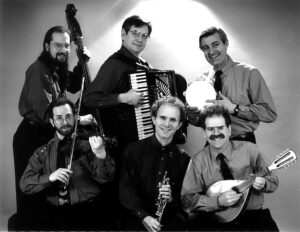
Walt, on accordion, had an aura. 1983
—–
* Dave Tarras, klezmer clarinetist, sometimes “re-gifted” his Jewish tunes to fit the Greek market, and vice versa.
“Der Freylekher Bulgar” is Yiddish for “The Happy Dance.” “Lerinsko Narodno Oro” is Macedonian for “Lerin Region Folk Dance.”
Thanks to Lori Cahan-Simon, musician and Yiddishist, for the correct spelling on “Der Freylekher Bulgar.”
December 10, 2010 3 Comments
MIRROR IMAGES
Yiddishe Cup occasionally plays mirrored halls.
Take La Vera. Or Casa di Borally. Or La Malfa (no mirrors but still heavy Italian).
Our latest mirrored hall gig was Armenian. Yiddishe Cup knows two Armenian tunes, which gets us through the night. We mix them with klezmer, jazz and pop.
I’m not bad on “Cold Duck Time” by Eddie Harris. Not good either.
I thought there were 300 people at the La Vera gig, because of the mirrors. There were about 150 people.
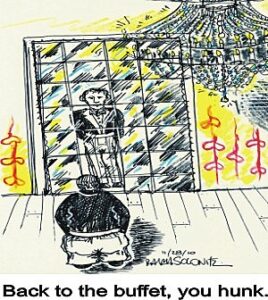
A guest asked if Yiddishe Cup is available July 11, 2011, for his daughter’s wedding at La Malfa. Yes, La Coppa Yiddishe is available, and call soon. July 11 is “tomorrow” in the band biz.
***
The premier mirrored hall in Ohio is the Hall of Mirrors at the Hilton Netherland Plaza in Cincinnati. That mirrored hall, built in 1931, is modeled after the Palace of Versailles.
Yiddishe Cup played a wedding in the Cincy hall for the great-grandchild of Arnold Schoenberg. A guest even sang a medley of Schoenberg art songs midway through the reception. That was a bigger party-killer than benching (post-meal prayers).
Yiddishe Cup is playing a Cincy wedding tomorrow night at the National Underground Railroad Freedom Center. We’ve never played there. Mirror situation, per favore?
—-
Illustration by Ralph Solonitz.
December 3, 2010 4 Comments
THE TOP 10 JEWISH ALBUMS
OF 2019
My apologies for not reviewing klezmer albums more frequently. My computer keyboard needs de-icing. There’s bad weather here. But no more excuses. Here are the best Jewish recordings of 2019.
1. Jews with Bagels. The Klezmatics cruise down the MOR (middle of the road) here, looking for the big paycheck– the one with six bagels after the “1.” Sure hit: “Tiny Bagels in the Wine.”
2. We Can’t Hear You. Klezmer Conservatory Band. This beloved group still pops, babbles and spits like a newborn. Recorded in a nursing home, in bed, in PJs. Hef feel. Swings.
3. Music for Young Lovers from Northern OH, Western PA and Western NY. Funded by NELFTY (Northeast Lakes Federation of Temple Youth). The record is lively waltzes and ballads for teens to cruise to. Not sure if this recording will keep the kinder from moving to Chicago and the East Coast, but it’s worth a try.
4. Ladder Me Up. Andy Statman’s homage to The Chief. If you buy this one, you can skip shul for six weeks.
5. The Great Hang. Steven Greenman’s triple CD. All originals, recorded in a single weekend (i.e. the great hang). Violinist Greenman sings on several tracks. Heavy breathing. Sexy. Not bad violin, either.
6. Lee Tully vs. Billy Hodes. Reboot. These two obscure 1950s Jewish comedians come out swinging. Tully’s version of “Essen” versus Hodes’ take. Two Jewish fighters in the same ring. You don’t see that every day unless you’re at an Orthodox shmorg (pre-wedding buffet). Hodes wins.
7. Jerzy Kosinski’s Ketchup. Daniel Kahn. What’s the difference between blood and ketchup? Are Heinz and Hunt’s the same thing? How’s the pourability? Where did green ketchup go? This recording is viscous . Check it out.
8. It’s All Greek. A bootleg from England. This double CD has 56 never-released Mickey Katz songs recorded for the Greek market. Includes “Open Half a Day on Sunday” and “My Gyro is Dripping.”
9. Readings on the Klezmer Generation. Bert Stratton’s cabaret show, recorded live at Nighttown in Cleveland. Stratton has a strange voice, as if he swallowed a bag of plastic Passover plagues. Painful on first listening, but after four cups of wine atrociously on-target.
10. The Jewish People are Mio. Roberto Rodriquez is 100 percent Jewish here: all freylekhs all the time. This is the perfect gift for the person who has everything but a Latin-Jewish alarm clock.
December 1, 2010 6 Comments
CINEMA TOPOGRAPHY
Nowhere Boy, the movie about John Lennon as a teenager, wasn’t that great. But the setting was.
The movie was very soap opera–ish. Lennon and his mother seemed to be having an affair on screen.
My wife, Alice, wanted to see Nowhere Boy. Or any movie. We had a friend visiting from out of town. The friend chose Nowhere Boy too. Alice said the movie had 81 percent on Rotten Tomatoes.
Eighty-one percent is horrible! But I went, to be a sport.
Nowhere Boy is a drama set in 1950s Liverpool: double-decker buses, Morgans and Teddy Boys. Yes!
Oh, to be in England . . .
[Please click video to continue:]
November 26, 2010 No Comments
THANKSGIVING WEDDING . . . SICK
When the mother of the bride says you’re on for the wedding, you’re not always on. The bride, not the mother, makes all final decisions. The bride can — and will — override Mom.
I once negotiated a Thanksgiving Day wedding. The mom thought Thanksgiving would be the perfect wedding day, because nobody would come. The groom’s side was from New York, so flights to Cleveland would be expensive. Terrific. And the locals would pass on the wedding to eat Thanksgiving dinner at home with their kids, who wouldn’t be invited to the wedding. Also, terrific.
I listened to this for three phone calls.
Then the mom hired Yiddishe Cup.
Yes!
The band members rescheduled their own Thanksgiving dinners. Not an easy task.
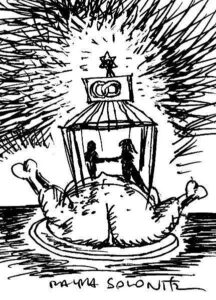 The mom called a fourth time and said the bride wanted a different band. I didn’t even ask who. I usually ask, but I was so mad — mostly at myself because I had forgotten the rule “it’s all about the bride.”
The mom called a fourth time and said the bride wanted a different band. I didn’t even ask who. I usually ask, but I was so mad — mostly at myself because I had forgotten the rule “it’s all about the bride.”
[Exception: A mom booked us for a Cleveland wedding, and the bride — from Seattle — ran up to the bandstand and said, “I hate klezmer music! How could my mother do this to me!”]
After Ms. Thanksgiving Turkey hung up, I called a second client — a bat mitzvah mom — who was late with her contract and deposit.
She said she wanted to talk more. I had already talked to her several times. I said, “Yiddishe Cup has been around over twenty years. You’ve seen us. Everybody has seen us. You know what we’re all about.”
She said her husband was sick.
Pause. Sick in the band biz means very ill. It sometimes means dying. I’ve played simchas (celebrations) for sick people; these affairs are the most poignant. I’ve seen dads roll down the aisle in wheelchairs. Dads who couldn’t talk because of strokes. Guys with half a brain left.
Yiddishe Cup has played for dead people; we played a bat mitzvah luncheon where the bat mitzvah girl’s mom died the day before. The funeral was the next day. We played in the family room instead of at the party center. Two or three people tried a hora.
The woman with the sick husband came to my house to further discuss the bat mitzvah. I asked what her husband’s illness was. She said he was depressed. Her husband — a doctor — had lost a patient that week.
He wasn’t sick! Doctors lose patients all the time! She just wanted to change the date, the number of musicians, and a few other things. Which she did.
The gig — on a new date, with fewer musicians — was surprisingly fun. Everybody was upbeat, and nobody bugged the band, except the good-natured grandfather, who said to our pianist, “Do you know your fly is down.”
Our pianist, not missing a beat, answered, “No, can you hum a few bars?”
Nobody was sick. That was something to be thankful for.
—-
Please see the post below too. It’s fresh.
—
Yiddishe Cup plays Columbus, Ohio, 6 p.m. Sun., Dec. 5. Chanukah. Please contact Tifereth Israel Congregation for details.
—
Illustration by Ralph Solonitz.
November 24, 2010 6 Comments
THE ESTHER ISENSTADT ORCHESTRAS
Bass player Esther Isenstadt ran classified ads in the back of the Cleveland Jewish News in the 1970s and 1980s: “Sophisticated music for discriminating people” . . . “Leave your records at home and bring LIFE to your party” . . . “From ‘The Hora’ to ‘Beat It.'”
Esther was gigging regularly when Yiddishe Cup started in 1988. I didn’t run into her. She was working the senior-adult circuit, while Yiddishe Cup was doing the glam jobs: bar mitzvahs and weddings. Esther was not a klezmer musician. She played mostly classical and pop — and some Jewish.
When I eventually met Esther, she was in The Weils assisted living facility. She was 86 (2003). She approached me after a Yiddishe Cup senior-adult program to say hello. I told her I knew of her. She smiled. I had one of her songbooks; I said I bought it used at the Cleveland Music School Settlement. She smiled again. Then she didn’t smile. She said, “I never thought I’d end up here!”
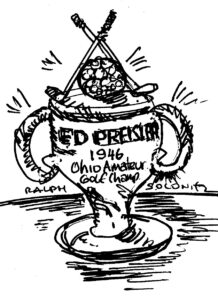 Ed Preisler — another Weils resident — chimed in, “I came out here to die.” (Ed died six months later.) Ed was the 1946 Ohio Amateur Golf Champion.
Ed Preisler — another Weils resident — chimed in, “I came out here to die.” (Ed died six months later.) Ed was the 1946 Ohio Amateur Golf Champion.
Ted Bonda, the former owner of the Cleveland Indians, was also there. I switched gears; I asked Ted, Ed and Esther — and the other people schmoozing after the program — if they knew Mickey Katz. One resident knew Mickey from Yale Avenue, Cleveland; another, from Berkshire Road, Cleveland Heights.
I asked the group if they were familiar with the word kile (hernia). Nobody knew it. That was surprising. Kile is the punch line in Mickey Katz’s song “16 Tons [of Hard Salami]” . . . “The balebus (boss) promised me a real gedile (glory), instead of geldile I catched me a kile (hernia).” The Weils was apparently not heavy-duty Yiddishists.
Esther Isendstadt had played in four suburban orchestras, raised a family, taught elementary school, led party bands and taught ESL in “retirement.” She was a Glenville High graduate, as were Bonda and Preisler. Glenville High was where Jewish overachievers went to high school in the 1930s. [John Adams High students — like my parents — would have disagreed with that. John Adams, in the Kinsman neighborhood, was more proste (working-class) than Glenville, but equally proud.]
I learned “Shir Lashalom” (A Song of Peace) from Esther’s book. That tune was a must-play in 1995 — the year Yitzhak Rabin was assassinated. The lyrics were in Rabin’s pocket when he got shot.
Esther had rubber-stamped Esther Isenstadt Orchestras on every other page of the used song book. A Jewish bandleader with a rubber stamp.
I got a rubber stamp.
Esther died last month at 93.
There weren’t many bands with names like the Esther Isenstadt Orchestra in the 1970s. There still aren’t.
—-
Illustration by Ralph Solonitz.
November 19, 2010 5 Comments
SHE STOLE MY SKIRT!
The tenant — a poet — said she liked the way the sunlight glinted through her living room blinds onto the hardwood floor.
“But what really got me,” she said, “was your company’s Craigslist ad about ‘a closet big enough to park a Mini Cooper in.'”
I liked her. She liked my copy writing. She thanked me for “two wonderful years.”
Another tenant — a waitress — interrupted the landlord-poet lovefest. The waitress, standing at the poet’s door, said another tenant — a third person — had just stolen the waitress’ skirt from the laundry room dryer and was wearing it.
“Wearing it in the building?” I said.
“Yes.”
The skirt was a full-length, tie-dyed orange, green and red hippie shmate. The skirt’s owner — the waitress — was 26.
The thief was a middle-aged black woman who wouldn’t answer her door. Not even when the cops showed up.
Meanwhile, I was also dealing with a drunk who had run her faucet all night, on purpose, and had called my manager a “pig.”
That woman got an eviction notice right then.
I decided to phone the black woman about the tie-dyed skirt. I got her boyfriend. Good. He was on the lease; she wasn’t. I told him the skirt thief had to be out in three days.
“Don’t put me out! She’ll go,” he said. He was a solid tenant, other than he left cigarette butts all over. He was 69 and “country” — from Tennessee. On his rent checks he wrote rant instead of rent in the memo line. (Another poet?)
“She can’t stay more than three days,” I said.
“Can I ask, sir, why is that?'”
“I rented to you, not her. The woman is not on the lease.”
I didn’t bring up the stolen skirt matter; that would have complicated things. But I wanted to say: “The next time your lady friend steals clothes from the laundry room, tell her not to wear the skirt in the building!” Out in three days.
My poet tenant enclosed a poem with her final rent payment. It began:
The way the forecast told of dark clouds,
drizzle, seemed more true than the way
the sun lit hills of trees, dull golds, rusts.
[by Karen Schubert]
I read that poem about 10 times. I concluded it was a “winter is a-comin in” poem. The drunks and skirt thieves were a comin’ in for the winter.
—-
Reminder: This blog is updated twice a week: Wednesday and Friday mornings. Please see the post below too. It’s kind of fresh.
November 17, 2010 No Comments
Y TU VIOLIN TAMBIÉN
From klezmer violinist Steven Greenman‘s “lawyer”:
Postscript: Galitzianers, please note, Greenman’s class begins Thursday (Nov. 18) in Santiago de Compostela, Spain.
***
Vid-loathers, here’s pretty much the same thing as the video, in text:
Klezmer violinist Steve Greenman asked my help in translating a Spanish contract. He thought he had a gig in Spain but wasn’t sure.
The contract wasn’t in Spanish. It was in Catalan, I guessed. Terceiro for tercero, for example.
We looked at an atlas. Verdict: Steve was going to Santiago de Compostela in northwest Spain, where he would teach master violin classes. The Spaniards probably had some local language up there. [Yes. Galician/Gallego.]
I said to Steve, “I saw a movie about a guy in a wheelchair filmed there. Can’t remember the name. It’s exotic. It’s nowheresville.” [The Sea Inside, 2007.]
Just another day for Greenman, who expects to get gigs in faraway places. He thinks the world will come to him because he has never made a mistake on violin. A klezmer gig in northwest Spain . . .
I was glad to be a part of it, even if my role was just to say “I have no idea what this contract says.”
November 12, 2010 2 Comments
SHOULD I RENT TO A STRIPPER?
(THE MOVIE)
This is the most acclaimed animation yet from the guys over at Challah-Barbaric. This movie may appear like a navel-gazing indulgence, but it’s not. It’s magical.
Should I rent to a Stripper? is the lost collaboration between Fred Flintstone and Maimonides. It is a guide for the perplexed landlord and tenant.
The two main characters — a sleazy guy from Yiddishe Cup LLC and a bug-eyed naïf — turn the nasty, grim, cutthroat real estate world into something even grimmer — and very robotic.
The landlord is so pompous at first. Then he’s more so. But the young lady draws forth a bit of the landlord’s humanity and even a Chanukah song lyric.
After the movie, the couple goes for drinks and has an affair.
2:57 minutes. United States, 2010
—-
[The first paragraph in the capsule movie review (above) is lifted, in part, from John Ewing’s Cleveland Cinematheque calendar.]
—-
This blog is updated every Wednesday and Friday morning. Please check out the post below. It is recently hatched.
November 10, 2010 7 Comments
DOWN AND OUT IN TROY, MICHIGAN
I was down and out in a Marriott hotel in Troy, Mich. The bride, several hours earlier, had told me, “I can’t dance in these shoes. Can I just watch the hora?”
She watched. I asked her three times if she wanted to be lifted on the chair. No, she said three times. The bride and groom stood in the middle of the hora circle like statuettes on a wedding cake.
There was no place to walk at the Marriott, which was in a large shopping development.
I wrote notes to myself on the hotel stationery to justify my existence. My truest observation: “Yiddishe Cup is providing a valuable service for the Jewish communities of the Midwest.”
The Marriott room had 8 pillows, 10 towels, 2 beds and 2 bathroom mirrors that showed everything.
I couldn’t justify 8 pillows, 10 towels, etc. I just couldn’t. That bride should have danced.
Luckily the hotel windows didn’t open.
—-
Yiddishe Cup plays this Sunday (Nov. 7, 4 p.m.) at the Brecksville United Church of Christ, Brecksville, Ohio. www.brecksvilleucc.org
—-
REMINDER: This blog now updates twice a week: Wednesday and Friday.
November 5, 2010 1 Comment
THE MIDWEST’S TOP 10 KLEZMER
. . . TOWNS
My nephew visits Big League baseball stadiums around the country as a hobby.
I visit Big League klezmer towns in the Midwest as a hobby. My remarks (below) are challah-to-challah comparisons. I’m not comparing Milwaukee to Paris.
The best Midwest klezmer towns:
1. Pittsburgh . . . Squirrel Hill, Shadyside. Everything you need. (Pittsburgh is not in the Midwest, but so what. It is west of the Alleghenies.)

Hebrew clock. Pittsburgh JCC
2. Chicago. The Midwest klez capital. Maxwell Street Klezmer Band is the band in the Midwest. A Cleveland boy — a Northwestern student — worked in the Maxwell Street office; I had that kid wired. Yes, a klez band with office help. Chi is that big. Powerful klezmer forces prevail in Chi. Max Street does not allow Ohio bands within 80 miles of The Loop. Yiddishe Cup played Rockford, Ill., once.
3. Detroit. West Bloomfield, a Motown suburb, has Temple Israel, a very attractive modern temple. There is such a thing. At concerts, the Temple Israel ark is curtained off by a striking yarmulke mandala.
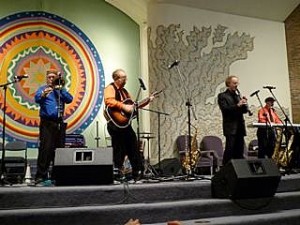
Yiddishe Cup at Temple Israel, 2010
4. Kansas City — as marvelously tough as Cleveland. KC’s Country Club Plaza is like Shaker Square but bigger and older.
5. St. Louis. Yiddishe Cup played there twice, then it all died out — the gigs. My Cleveland rabbi, who is from St. Louis, has a couple seats from the old Busch stadium. He should install the seats on our shul’s bima (altar) and invite Enos Slaughter to give the d’var torah (torah lesson/sermon). Good custard — Ted Drewes — in St. Louis. Similar to Cleveland’s East Coast Original Frozen Custard.
6. Milwaukee. Its claim to fame: songwriter Sigmund Snopek III, who wrote “Thank God This isn’t Cleveland.”
7. Minneapolis. There are a lot of klez bands up there: Prairie Heym Klezmorim, Klezmerica, etc. Too much klez in Minnie. Yiddishe Cup will never play there.
8. Cincinnati. The Plum Street Temple, where Stephen Wise officiated, is the most rakish and Moorish synagogue in the country. Check it out.

Plum Street Temple
9. Buffalo. Terrific art museum. Underrated.
10. Indianapolis. Overrated. A suburb of Atlanta.
Cleveland isn’t ranked. That wouldn’t be fair. But off the record, Cleveland is number one.
November 3, 2010 5 Comments
THE CHOCOLATE FLOWS LIKE A RIVER
At a candy-theme bar mitzvah, the dessert table is tortes and truffles, and the kids’ table is do-it-yourself ice cream sundaes and candy bars.
The bar mitzvah boy — the candy man– has a custom-printed candy bar named after him. The nutrition data reads: “Serving size — 1 young man. Ingredients — charm, wits, humor . . .”
Yiddishe Cup wants its own candy bar. It’ll be dark chocolate with slivers of old clarinet reeds. We’ll put these treats in the goodie bags for the bar mitzvah kids.
Any leftovers, we’ll take to Yiddishe Cup’s haunted house. This year our torture chamber features Don Friedman, our drummer, telling nonstop Internet musicians’ jokes like “What is the definition of an optimist? A trombonist with a beeper.”
Any leftover chocolates from the haunted house, we’ll give to our keyboard player, Alan Douglass, who is good for a candy bar and diet pop many mornings. Repeat at bedtime. I bought him a Snickers at a gas station and he refused it. It has to be MilkyWay or Three Musketeers.
***
The candy expert is Steve Almond, author of Candy Freak.
I, too, did some candy reporting, but I didn’t have the name for a career in it. In the 1980s I interviewed a chocolate factory owner who claimed dark chocolate was a Jewish thing. Maybe because of kashrut? [Jewish dietary laws]
Yes, a lot of Jews prefer dark chocolate. For one thing, it is a health food.
This year Yiddishe Cup is trick-or-treating as klezmer musicians. Yes, again. But with a twist: we’re ditching the Tevye vests and caps, and going as chocolate fountains with silver-foil Frank Gehry antlers dripping Hershey’s syrup onto our faces.
—-
1 of 2 posts for 10/27/10. Please see the post below too.
October 27, 2010 8 Comments
WHAT ANIMALS TO BRING TO A JOB INTERVIEW
Before I hire a building manager, I interview the candidate at his residence.
One man’s house had no front stoop, and he had four dogs in the living room. There was hardly any non-dog space in that house. We wound up in a bedroom on the third floor. There was a big bird up there.
How about a doormat that says “Got beer?”
I once hired a woman with that doormat and she worked out well. She was a steady worker and controlled her drinking.
Ethnic factory workers are usually solid too. Too bad they don’t exist anymore.
Ethnics or factories?
Both.
Benny Artino, a building manager, worked the day shift at Eaton Axle. His wife, Betty, was the world’s best cleaner. She wanted to be buried with a can of Comet. I gave Betty an unlimited cleaning budget. She liked to vacuum the halls every day. I didn’t try to stop her. Why would I?
When the Artinos’ son Paisan bought an apartment building in Tampa, he asked my advice, and I said: “Buy the biggest building you can afford. You might have one boiler and one roof for multi-suites, or you can have the same one boiler and one roof for a double house.”
One of my worst hires was a cocaine addict. She ran up my Home Depot account with charges for an air compressor and tool box. The gift certificate $50 was over the top. She fenced the items.
After I fired her, I went to Taco Bell to reconsider. My father had given an employee a second chance after she had ripped him off, and she had repaid my dad and stayed on the job.
But my custodian — the coke head — had told me, “I have a few shopliftings but I never stole from people.” Was I not people?
I stuck with fired. I didn’t say, “You’re fired.” I said, “If you turn in the keys this weekend, I’ll pay your moving expenses and give you four-hundred dollars, and I won’t call the cops.” Sometimes it pays to pay people to move.
***
My favorite manager, at least to listen to, was “Roy Hamilton,” circa 1978. (“Roy Hamilton” is a composite of several former building managers.*) . . .
Bert, little bitty buddy, I’ll tell you one thing I done: I had this old car, couldn’t get it to do nothing. I pushed and pulled and beat on it. Then I throwed it over a cliff by the Rapid ravine. I said, “Let’s throw over a car.” Me and my boys done it.
My old lady was against it. She was the biggest woman for churchgoing you ever seen. She thought she was better than me.
She was skinnier than a stick. Totally emancipated. And ornery. When she got money, that heifer, watch out. Man, I didn’t dig her.
She’s still here, on Madison, over a jukebox. She breaks 100 on a good night at Mahall’s [bowling alley]. She came at me with a mouth full of beer. Got all over the floor and balls.
She’s got claws. They all do. Bert, there’s a lot of good-looking heads out there just waiting to nail you to the cross.
She makes me sick. Ferocious of the liver. That’s a situation. Nobody comes between me and my beer, but that broad somehow does.
It’s all in the numbers. Course it is. I ain’t asking for much. This upcoming repression is going to be so bad it’ll shake your teeth loose. I just want to be reborn the poodle of a rich lady. That’s my next life.
Little bitty buddy, you got a number? Ain’t nothing but 1, 2, 3. Give me a number. What’s the new rent on apartment 34? $235? That’s my number. You just gave me a number!
—
* “Roy Hamilton” is mostly the real Roy Hamilton, a Tennessee-born building manager who was a painter at Midland Steel (Cleveland). He died in 1984. Note: I lifted several lines (in the first two paragraphs of this “Roy Hamilton” saga ) from Arkansas writer Charles Portis, to get in gear.
—
1 of 2 posts for 10/20/10. Please see the post below too (which was technically put up yesterday).
October 20, 2010 1 Comment
HOW HARVEY PEKAR DIED
Comic book writer Harvey Pekar died from an “accidental” overdose of anti-depressants, the Cuyahoga (Cleveland) County coroner ruled.
Powell Caesar, the coroner’s spokesman, said Pekar died from “acute intoxication via ingesting fluoxetine [Prozac] and bupropion [Wellbutrin].”
Powell continued, “The death was accidental. Ingestion was accidental. This case is closed.”
The autopsy and toxicology analyses were completed last week.
Harvey died July 12 in his bedroom in Cleveland Heights.
I contacted the coroner’s office (and talked to Powell Caesar) because I hadn’t heard, or read, how Harvey died.
October 19, 2010 3 Comments
WOLVERINE BLUES
1. RAH-RAH AND SO-SO
A simple fall pleasure is walking around Shaker Lakes listening to Michigan football on the radio.
I came by this diversion fairly recently. My older kids went to liberal arts colleges with no football teams. I figured my youngest child would too. I took him to Oberlin on a college tour and said, “Can you see yourself here?”
“In a word, Dad, no,” he said. “There’s not enough sports talk.” Jack, the youngest, wanted rah-rah.
He went to Michigan and got rah-rah. We rehashed the football games his freshman year.
I monitored the university’s Web site like a helicopter parent. I told my son to audition for the pep band, the Hillel a cappella group, the school’s percussion group and anything else he could think of. I wanted him to find a niche at the Big U.
And I wanted Michigan to win at football, because my son was so rah-rah.
I followed the football games on the Internet my son’s first year. I didn’t know about the games on Cleveland radio. That was stupefying — the Internet — like staring at a tickertape: Joe Blow . . . 3 yards . . . 3rd and 5 . . . M 46 yard line.”
Then I serendipitously found Michigan football on Cleveland radio. No more squinting at the computer. The announcer promoted Detroit pizza parlors and grocery stores. I felt like a ham operator picking up an exotic locale. “Gratiot at 8 Mile.” CKLW radio — the border blaster — was sending out the Wolverine word from Windsor.
Michigan football isn’t on CKLW this year. It’s on a weak FM station from Detroit. End of my fall bliss.
The team used to be good, then suddenly stunk. The university hired a new coach.
I asked my son what he thought of the new guy.
He said, “Who is it?”
He didn’t know about Rich Rod! (Rich Rodriquez, the new coach.) Jack had fallen under the sway of the football atheists at the Residential College and music school.
I knew more Michigan football than my son. I was now rah-rah and he was so-so. Odd.
***
2. SONNY, LISTEN
A PhD classical music student at the co-op house in Ann Arbor didn’t like my practicing. He didn’t like jazz, period. And he didn’t like my girlfriend. He called her a “hole,” which was black slang around 1970. This guy, though, was a tall blond Texan.
Tex would answer the house phone and announce to one and all: “Bertie, your hole is on the line.” (“Bertie” wasn’t too cool either.)
I punched him. He was seated on the couch in the co-op living room. I hit him and his coffee went flying. He stopped bugging people — at least me — after that. He thought I was nuts.
I wasn’t nuts. I haven’t attacked anybody since, except a teenager I punched when I taught at an ESL school. (Different story.)
In 1970 Miles Davis had just released Bitches Brew, the first big-time jazz-rock album. I borrowed recordings of Hank Crawford, Lou Donaldson and Rufus Harley from black students. I went to Baker’s Keyboard Lounge in Detroit to see Gene Ammons, Sonny Stitt and Roland Kirk.
Tex became an administrator in the Michigan music school. Mazel tov. He stayed there forever.
My youngest kid went to music school at Michigan. Mazel tov. I occasionally went to see my son perform and kept an eye out for Tex. I didn’t run into him. I was ready to apologize, unless he called me Bertie again.
Bertie? That numbskull, I swear . . .
October 13, 2010 6 Comments
THE KLEZMER RANKINGS
The Irish rank musicians with fiddle contests. So do bluegrass players. There is now even a $50,000 Steve Martin Prize for Excellence in Banjo and Bluegrass.
Jews established rankings at the Safed (Israel) Klezmer Festival, then stopped for some reason. Former Klezmatics violinist Alicia Svigals won first prize. This was more than a decade ago.
Nowadays the Jewish plucking order is out of order. Is one’s Jewish music ranking determined by where one sits at klezmer conventions? If you eat with the students, does that mean you’re amhoretz? (commoner/person of the earth). If you sit with the German long-hairs, are you going on tour in Europe soon? If you’re dining with the dentists, doctors and conference board members, do you have ulterior — biz! — motives?
At KlezKanada, one staff instructor kvetched she wasn’t paid enough for the walk-by consultations from the amhoretz in the dining hall — students asking for musical pointers and xeroxes of transcribed music.
I knew about that — pestering the staff. I bothered virtuoso clarinetist and teacher Kurt Bjorling at KlezKamp on Christmas morning. He was assembling a model train on his hotel room floor. I asked about krechts (klezmer groan/sob) technique. I wanted to be the klezmer king. The Christian king’s birthday could wait a few minutes.
***
I am a klezmer king now. (One of a few. I make the rankings.)
Here are the latest King of Klezmer rankings from The Challah Fame, Cleveland. The ratings change daily, except Saturday.
#1. Martin van de Ven. Clarinet. Canada. Van Da Man.
#2. Alan Douglass. Keyboards. Ohio. His smash hit was “Gentile on My Mind”, 2004. [Listen.]
#3. Ari Davidow. Klez cyberczar. Massachusetts. Operates the KlezmerShack in the basement of the Brandeis student union by the Foosball tables.
#4. Steven Greenman. Violin. Ohio. Born Steven Chemlawn.
#5. Annette Ezekiel Kogan. Accordion. New York. Her name is longer than her skirt. She donates letters from her skirt while playing.
#6. Michael Alpert. Violin/mustache. New York.
#7. Gary Gould. Clarinet. California. Bandleader to the stars’ sons’ bar mitzvah parties near, but not in, Santa Monica.
#8. Cookie Segelstein. Violin. California. Rugelach Queen.
#9. Christian Dawid. Clarinet. Germany. In the States, Christian says, “Call me Dave.”
#10. Cookie Lavagetto. Third base. Washington Senators.
#11. Bert Stratton. Clarinet. Ohio. Klez merch mogul. Worldwide distributer of Yiddishe Cup mugs, baseball caps and T-shirts.
#12. Margot Leverett. Clarinet picker. New York. Former Miss Jewish Indiana.
#13. Lori Cahan-Simon. Vocals. Ohio. Produced Der Yiddisher Soul Train, KYW-TV, Philadelphia, 1967-1971.
#14. Marc Adler. Clarinet. Rhode Island. Invented the clarinet suck vac, available only at Adler’s Hardware, Providence, R.I.
#15. Yale Strom. Violin. California. Born University of Pennsylvania Strom.
—-
1 of 2 posts for 10/6/10. Please see the post below too.
October 6, 2010 4 Comments
“I DO NOT LIKE RICH PEOPLE”
A Yiddishe Cup musician, loading in at a country club, said, “I do not like rich people.”
You talkin’ to me?
What’s the median household income in the United States — $50,000?
I had access to Alan Dershowitz’s cell phone number. He did the Electric Slide at a bar mitzvah party. (I wasn’t playing; I was a guest.) I could have posted Dershy’s dorky disco on YouTube, but why embarrass a landsman – and maybe get sued. [“Landsman” means paisan.]
Dershowitz has a place on the Vineyard, I learned. Dershy is rich. “Rich” is pronounced “well-off.”
Maybe my band mate, at the country club, was upset because the club’s manager, Kim, wouldn’t let us in the buffet line, and had told us to drink only lemonade, not even pop. And we couldn’t go into the kids’ buffet line, even with all the fried junk there. [Kim is not her real name.]
We got cold-cut sandwiches around 2:30 p.m. This, for lunch?
I’ll eat anything. The video guy wouldn’t. (Later, he would.) He said, “It is truly a disgrace to serve this to professionals.” He said that to the musicians, not the manager.
I do not like rich people . . .
Photographer Herb Ascherman got a decent meal. No wraps for Herb. In his contracts, Herb has the line “client will provide a hot meal.” Herb knows how to deal with rich people and Kim, who is rich, but not well off.
—-
2 of 2 posts for 10/6/10
October 6, 2010 1 Comment
TRAVELING VIOLATIONS
1. JERUSALEM
Yiddishe Cup’s dance leader, Daniel Ducoff, flies frequently for his day job as university fundraiser. He knows which security lines are fastest. Even if he’s flying Continental, he’ll often switch to the quicker Southwest line at Cleveland airport.
Man against the machine . . .
My Uncle Al griped about tour bus drivers in Israel who turned the air conditioning too high.
My parents had travel stories about drunken Russians on cruise ships. And I heard about haggling for a gold wine bottle in Italy. I saw the slides.
I threw out the slides. I have one left: my parents at The Wall in Jerusalem. My dad had on Jack Purcells. He was always in a hurry.
My dad kept a list of his purchases abroad. Here it is, abbreviated:
Rosewood carving of temple dog. Bangkok
Ceramic bells. Israel
Porcelain-in-pewter bowl. Hong Kong
Brass circular dish. Morocco
Wool flokati rug. Athens
My parents didn’t buy all that much. No jewelry and not much clothes. My dad left me plenty, but very little clothing. I’m not complaining. I got buildings.
***
2. KENTUCKY
Daniel Ducoff — Yiddishe Cup’s Sir Dance-a-lot — collects refrigerator magnets of states Yiddishe Cup has played. Sometimes I give Daniel magnet investment advice. For instance, 10 years ago I told him to buy “Kentucky.”
It was getting on my nerves — not playing Kentucky. Kentucky is ridiculously, abuttingly close, to Ohio.
The conductor of the Cleveland Pops Orchestra has played in 10 foreign countries and 29 states. Who’s counting.
Next month Yiddishe Cup plays Connecticut — a state which isn’t even on our screen. Is Connecticut a legitimate state? Does it have a state bird? Connecticut seems more a township or shire than a state.
Yiddishe Cup has played Ohio, Indiana, New York, Texas, Illinois, Missouri, Wisconsin, Georgia, Virginia, North Carolina, West Virginia, Michigan, Pennsylvania, Kansas, Iowa, Nebraska, Florida, Canada and, shortly, Connecticut.
Connecticut but no Kentucky. Why?
Yiddishe Cup plays in Lakeville, Conn., on 10/10/10 for a wedding. Klezmer bandleaders from the Northeast will not be happy to read this.
Or maybe they won’t care. Maybe they’ll all be in Kentucky that day.
***
3. NORTH CAROLINA HAIKU
The Greensboro Furniture Mart
convention
is happening.
No beds except at the seedy hotel
across from the Executive Club
which in Cleveland is a catering hall
but in NC is a strip joint
Are we in Amsterdam?
Continental breakfast
The Corn Flakes in the Styrofoam bowl
need milk
for weight
fast
Too late
Where’s the broom?
Musicians with instruments
at the Delta counter
“Our gig was colder than an MF,” their drummer says
“You played outside?” our singer says
The Neville Brothers’ drummer
Even the big boys freeze their pupiks.
—-
1 of 2 posts for 9/29/10. Please see the post below too.
September 29, 2010 4 Comments
BEST CROSSTOWN COMMUTE EVER
Stan Ebin, a Dixieland trumpeter and radio DJ, played these tunes on WKHR-FM:
1. “Hora Staccato.” Rafael Mendez, trumpet. Didn’t Dave Tarras record this same tune? [Yes.] (Listener’s GPS location: I-90 at Lakewood/McKinley Ave.)
2. “Blues in C# Minor.” Roy Eldridge, trumpet. (I-90 at West 117th Street by White Castle.)
3. “Lena from Palestina.” Buffalo Ridge Jazz Band from Cincinnati. This tune, like “Hora Staccato,” is part of the klezmer repertoire. (There are three “C” Innerbelt exits in a row: Central, Carnegie and Chester avenues.)
4. “Bless this House.” Four-part barbershop harmony, all on trumpet, overdubs by Roger Blackburn. (Carnegie Avenue at East 55th Street, by the old Warner & Swasey factory, where machinists made machine tools with machine tools.)
5.”Basin Street Blues.” Louis Prima, trumpet and vocals; Pee Wee Russell, clarinet. (Carnegie Avenue by the Cleveland Clinic banner “One of America’s Top 4 Hospitals.” What are the other three? Mayo Clinic, New York-Presbyterian and Johns Hopkins? No. Add Mass General, delete New York-Presbyterian.)
6. “I Can’t Get Started.” Dizzy Gillespie, trumpet. Ebin, the DJ, says, “Dizzy is stealing from Bunny Berigan.” (Stokes Boulevard by the Baldwin Water Works Plant.)
7. “Wah-Hoo.” Hoosier Hot Shots. Spike Jones before there was Spike Jones. 1935. [At the former Cleveland Heights pothole (now repaved) vortex: North Park at North Woodland.]
Two klezmer tunes, plus interesting old jazz, in a 30-minute drive from the West Side. On regular radio. Amazing.
—-
2 of 2 posts for 9/29/10.
—-
Yiddishe Cup plays tonight (Wed. Sept. 29) 7 p.m., Fairmount Temple, and tomorrow (Thurs. Sept. 30) 7:15 p.m., Park Synagogue, for Simchat Torah. Cleveland.
September 29, 2010 2 Comments




